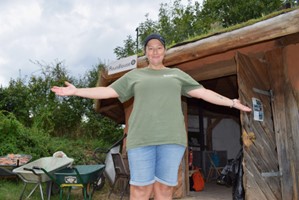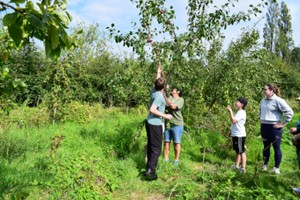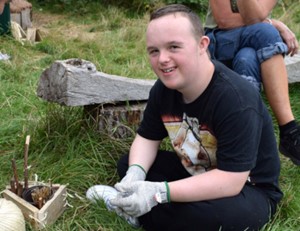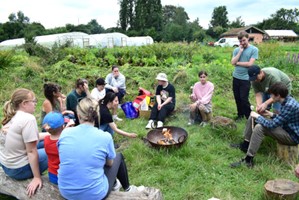Forest school boosts health and wellbeing
In this blog:
- Why spending time outdoors is important
- My Brandon journey
- Forest school leader qualification
- Forest school vision
- The benefits of forest school
- Activities on offer
- Feedback from parents and staff
- Work with us
 Hi. My name’s Rachael and I’m a project leader for Brandon’s children’s services.
Hi. My name’s Rachael and I’m a project leader for Brandon’s children’s services.
According to a scientific report from Nature journal, spending as little as two hours a week in an outdoor space can significantly boost health and wellbeing, improve mood, and is known to suppress the stress hormone, cortisol, helping to improve anxiety and depression.
Why spending outdoors is important to me
In 2015, I was diagnosed with a long-term health condition. I tried many forms of treatment, both holistic and medical. It was during this time that I became interested in how spending time outdoors could help my recovery and how it benefitted me when I took time to appreciate my surroundings away from modern technology and the general stresses of life.
My Brandon journey
In 2019, I joined Brandon as a support worker with the Young Person’s Outreach project. I was supporting youngsters to access the community and gain life skills, working towards independence.
When COVID hit, spending time outdoors became one of the few things that we could do and I took the opportunity to explore what activities could be offered to the people we support.
Over the coming months, I organised outdoor art sessions, nature scavenger hunts, and nature photography sessions. At a time when many young people were suffering from lack of social interaction, spending this time outside and connecting with nature, offered something positive to focus on.
My forest school leader qualification
 Previously, forest skills at Brandon had been outsourced. Although the sessions provided an opportunity for children to experience activities, they did not provide long-term benefits. In addition, they were expensive and didn’t allow for a child-led/person-centred approach.
Previously, forest skills at Brandon had been outsourced. Although the sessions provided an opportunity for children to experience activities, they did not provide long-term benefits. In addition, they were expensive and didn’t allow for a child-led/person-centred approach.
So, with a newfound appreciation of all things outdoorsy, I decided to enrol on the Level 3 Forest School Leaders’ course, which would allow me to set up and run my own forest school. At the same time, I applied for a project leader post in Brandon’s Playlink team. In April 2023, I gained my level 3 qualification along with an outdoor first aid qualification.
Our forest school vision
Our vision was always to offer outdoor forest school sessions to people supported by Brandon, and so the work began.
The first challenge was to find a suitable site. After exploring various options, we decided to run an engagement day at Grow Wilder in Frenchay, Bristol. More than 20 families attended.
Following positive feedback, we spent the next six weeks creating a programme of engaging activities, completing risk assessments, writing a forest skills handbook, and securing equipment and natural resources, all ready for the start of the summer holidays.
The benefits of forest school
 Being in nature offers practical, sensory experiences that are suited to the preferred learning styles of many children. Our forest school, Playlink Rewilded, is organised in much the same way as our other schemes, being primarily child led.
Being in nature offers practical, sensory experiences that are suited to the preferred learning styles of many children. Our forest school, Playlink Rewilded, is organised in much the same way as our other schemes, being primarily child led.
When attending forest school, most children with special educational needs benefit from increased communication and social skills. Most children’s behaviour is reported as calmer.
Activities on offer at Playlink Rewilded
Playlink Rewilded offers many different activities including; lighting fires and campfire cooking, storytelling, games, crafts, woodwork and tool work, bug hunting, den building, foraging, and mindfulness.
The sessions follow a loose structure. We plan activities, but we fully encourage child-led exploration. The Grow Wilder site works perfectly, with areas for self-reflection, areas for time away from the group, and six acres of land and open-ended resources for bug hunting and nature exploration, undercover canvas for crafting, and plenty of space for den building.
Campfire cooking was a particularly popular activity. We foraged for blackberries and made jam, made campfire popcorn, chocolate orange muffins, and campfire breadsticks.
We also made bug hotels, enjoyed peg loom weaving and Tataki-zome (Japanese flower pounding). We used palm drills to make natural art, den building and sensory games, and generally had lots of fun.
Feedback from parents and staff
 During the summer break, we delivered 10 forest skills sessions, to more than 60 children. We received some amazing feedback from parents and members of staff.
During the summer break, we delivered 10 forest skills sessions, to more than 60 children. We received some amazing feedback from parents and members of staff.
Comments from parents included: “He loved that it was chilled, outside using a fire, and making things from nature. Forest school is fantastic!”
Another parent said: “He was the best at hiding and good at catching newts! He also made jam - which he brought home and was very tasty.”
One member of staff said: “The children who attended got so much out of it. One boy said that he didn't want to be there and he didn't enjoy or like nature. By the afternoon, he was engaging in games, cooking on the fire, and bug hunting. He loved it!”
Another said: “Incredible leadership. As the summer went on it became apparent that each session would be different based on the children attending. Rachael was very adaptable to this.”
Rachael Scrase
Project Leader
Interested in working with us at forest school?
Having received such great feedback, we’re already planning our October half term sessions. They will run on 26 and 27 October.
If you’re interested in joining the staff team, please contact one of our project coordinators.
Joe Wedgbury: 07464 670 703 | joe.wedgbury@brandontrust.org
Amber Byles: 07464 670 706 | amber.byles@brandontrust.org
Photo 1 credit: Elliot

